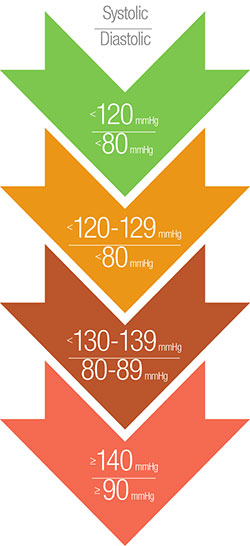
Heart-Healthy Living
Live a heart-healthy lifestyle to help decrease your chance for a heart event or condition.
Basic Tips for Heart-Healthy Living
- Exercise. Work with your doctor to develop the best fitness plan for you.
- Maintain a healthy weight.
- Eat more fruits and vegetables and less high-fat food.
- Get stress under control. Make time for yourself and the activities you love.
- Know your blood pressure and cholesterol numbers. Work with your doctor to reach the numbers right for you.
- Manage your diabetes, or test for diabetes and pre-diabetic conditions if you’re at risk.
- Cease tobacco use. Tobacco is one of the leading causes of heart disease and doubles your risk for cardiac arrest.
Eat for a Healthy Heart
Eating fewer calories is one way to begin a heart-healthier diet. Take these nutrition tips from the American Heart Association:
- Substitute natural applesauce for butter or shortening in baked goods.
- Replace heavy cream and whole milk with skim or low-fat milk.
- Use olive oil instead of butter, lard or shortening when you cook.
- Choose low-sodium food products over their originals, such as low-sodium ketchup or broth.
- Substitute ground turkey or chicken for pork or beef.
- Replace a portion of the white flour in your recipes with whole-wheat flour.
Get Help with Tobacco Cessation
Reduce your risk for heart disease, cancer and other health conditions by ceasing use of all tobacco products. We understand quitting can be hard. It’s why we provide you with individual tobacco cessation counseling to help you tailor your cessation program to your specific needs.
Attend a Wellness Seminar
Find the help you need to stay motivated on your weight-loss journey. Get tips to help you manage stress. Learn how to make lifestyle changes and improve your wellbeing. The UHS Adult Weight Management and Wellness Seminars in Johnson City can help you do all that and more. Sign up for a seminar online or call the Stay Healthy Center in Johnson City at 607-763-5092 to learn more about our heart healthy exercise and nutrition program.
Participate in a Medically Supervised Exercise Program
Continue your recovery from a heart event after your cardiac rehabilitation ends or simply improve your overall health in the UHS Health & Wellness Program. Exercise with confidence knowing that cardiac-certified registered nurses and exercise physiologists create, oversee and assist with your exercise routine. Benefit from counseling and emotional support if you need an extra boost, and get educational materials to keep you informed about your health. To set up an intake interview with a registered nurse and learn more about our Johnson City heart healthy exercise and nutrition program, call 607-762-2178.
Know your blood pressure - and what to do about it*Normal Blood Pressure Elevated Blood Pressure High Blood Pressure Stage 1 High Blood Pressure Stage 2 *Talk to your doctor for individualized recommendations. |
-
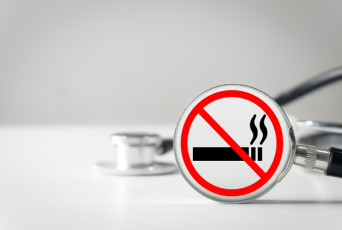 UHS supports tobacco cessation in partnership with St. Joseph's HealthFebruary 13, 2026
UHS supports tobacco cessation in partnership with St. Joseph's HealthFebruary 13, 2026UHS is pleased to announce its continued collaboration with the Central New York Regional Center for Tobacco Health Systems at St. Joseph's Health. Through this partnership, UHS has strengthened its tobacco-dependence treatment policy, aligning it with the Public Health Service Clinical Practice Guidelines.
-
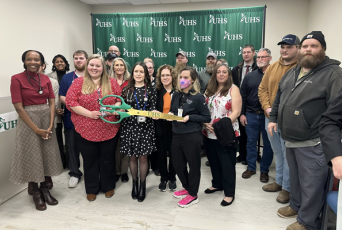 UHS Pediatrics Upper Front Street holds ribbon-cutting ceremonyFebruary 13, 2026
UHS Pediatrics Upper Front Street holds ribbon-cutting ceremonyFebruary 13, 2026On Thursday, February 12, UHS hosted a ribbon cutting to celebrate the opening of UHS Pediatrics Upper Front Street. The practice, which previously served patients on Chenango Bridge Road, welcomed its first patients at the new location on February 2.
-
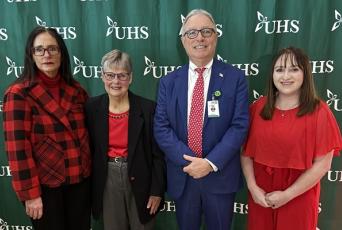 Spotlighting heart health awareness with ‘Go Red for Women’ campaignFebruary 10, 2026
Spotlighting heart health awareness with ‘Go Red for Women’ campaignFebruary 10, 2026People across the country – and throughout the Southern Tier – wore red on Friday, February 6, to raise awareness of heart disease in women as part of National Wear Red Day, a cornerstone of the American Heart Association’s Go Red for Women campaign.
-
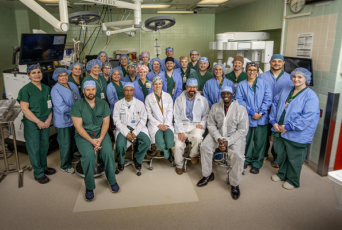 UHS brings next generation of robotic surgery to UHS Binghamton General HospitalFebruary 09, 2026
UHS brings next generation of robotic surgery to UHS Binghamton General HospitalFebruary 09, 2026UHS has reached a new milestone in surgical care, becoming the first hospital system in Greater Binghamton to use the da Vinci 5 surgical system for robotic-assisted procedures.



